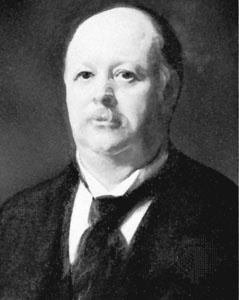Reed, Thomas B
American politician
born Oct. 18, 1839, Portland, Maine, U.S.
died Dec. 7, 1902, Washington, D.C.
 vigorous U.S. Republican Party leader who, as speaker of the U.S. House of Representatives (Representatives, House of) (1889–91, 1895–99), introduced significant procedural changes (the Reed Rules) that helped ensure legislative control by the majority party in Congress.
vigorous U.S. Republican Party leader who, as speaker of the U.S. House of Representatives (Representatives, House of) (1889–91, 1895–99), introduced significant procedural changes (the Reed Rules) that helped ensure legislative control by the majority party in Congress.After he was admitted to the bar in 1865, Reed began his law practice in Portland and was elected to the Maine House of Representatives in 1868 and to the state Senate two years later. He was elected to Congress on the Republican ticket in 1877 and served continuously until the end of the century. In 1882 he was appointed to the House Committee on Rules, and when the Republicans regained control of the House in 1889, Reed was elected speaker. As a strong speaker, he arranged for the control of the Rules Committee by the majority party in Congress.
The Reed Rules, adopted in February 1890, provided that every member present in the House must vote unless financially interested in a measure; that members present and not voting be counted for a quorum; and that no dilatory motions be entertained by the chair. Reed claimed these innovations enhanced legislative efficiency and helped ensure democratic (majority) control of the House; many thought they made a major contribution to the U.S. political system by establishing the principle of party responsibility. His dictatorial methods were bitterly attacked by the opposition, however, who called him Czar Reed. Nevertheless, the Reed Rules and methods were adopted by the Democratic leadership in 1891–95, and the power of the Rules Committee was increased.
Though denied the 1896 presidential nomination he had sought, Reed nonetheless supported the domestic programs of Pres. William McKinley and exercised a powerful influence in guiding bills through Congress. In 1899, however, he broke with the Republican administration over what he considered its expansionist policy toward Cuba and Hawaii. He resigned from the House in protest and retired to New York to practice law and to write.
- Conte Sforza, Carlo
- Conti, Armand I de Bourbon, prince de
- Conti, François de Bourbon, prince de
- Conti, François-Louis de Bourbon, prince de
- contiguity, theory of
- Conti, Louis-Armand I de Bourbon, prince de
- Conti, Louis-Armand II de Bourbon, prince de
- Conti, Louis-François de Bourbon, prince de
- Conti, Louis-François-Joseph de Bourbon, prince de
- continent
- Continental Airlines, Inc.
- continental air mass
- Continental Congress
- Continental Divide
- Continental Divide National Scenic Trail
- continental drift
- Continental Group, Inc.
- continental landform
- continental philosophy
- continental shelf
- continental shield
- continental slope
- Continental System
- Conti, Niccolò dei
- continued fraction